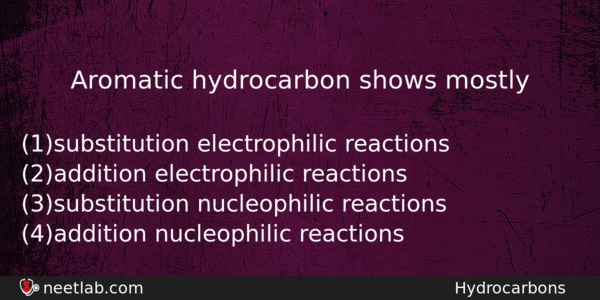| ⇦ | 
| ⇨ |
Aromatic hydrocarbon shows mostly
Options
(a) substitution electrophilic reactions
(b) addition electrophilic reactions
(c) substitution nucleophilic reactions
(d) addition nucleophilic reactions
Correct Answer:
substitution electrophilic reaction
Explanation:
No explanation available. Be the first to write the explanation for this question by commenting below.
Related Questions: - Hardness of water due to presence of salts of
- Which of the following species has plane triangular shape
- The percentage weight of Zn in white vitriol [ZnSO₄ 7H₂O] is approximately equal
- Which of the following can not be hydrolysed into aldose and ketose
- Diazo-coupling is useful to prepare some
Topics: Hydrocarbons
(84)
Subject: Chemistry
(2512)
Important MCQs Based on Medical Entrance Examinations To Improve Your NEET Score
- Hardness of water due to presence of salts of
- Which of the following species has plane triangular shape
- The percentage weight of Zn in white vitriol [ZnSO₄ 7H₂O] is approximately equal
- Which of the following can not be hydrolysed into aldose and ketose
- Diazo-coupling is useful to prepare some
Topics: Hydrocarbons (84)
Subject: Chemistry (2512)
Important MCQs Based on Medical Entrance Examinations To Improve Your NEET Score
18000+ students are using NEETLab to improve their score. What about you?
Solve Previous Year MCQs, Mock Tests, Topicwise Practice Tests, Identify Weak Topics, Formula Flash cards and much more is available in NEETLab Android App to improve your NEET score.
Share this page with your friends

Benzene and it’s derivatives is much more stable than expected. The extra stability means that benzene will less readily undergo addition reactions. The more loosely held electrons are open to attack by electrophiles. Hence, the characteristic reaction of benzene is electrophilic substitution reaction.